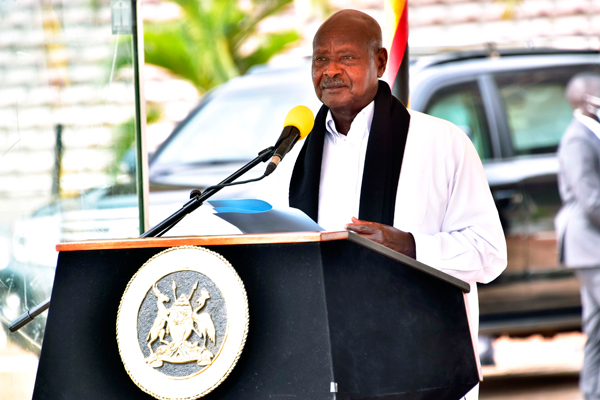Prime
Museveni narrates first encounter with HIV/Aids

President Museveni speaks during the commemoration of the World Aids Day at Kololo Independece Grounds in Kampala December 1, 2021. PHOTO/PPU
What you need to know:
- The President said he called Dr Sam Okware who was then heading the National Aids Control Programme at the Ministry of Health and interrogated him on conflicting accounts of how the virus spreads.
Uganda yesterday commemorated the World Aids Day, approximately four decades since the first case was discovered in Rakai District in central region.
President Museveni, who officiated at the national commemoration held in Kampala, said his first encounter with Aids was around 1983 when they were in the bush fighting. He took over power in 1986.
“There was one of our soldiers who got sick and the doctors we had in the bush tried everything possible to treat him. They treated malaria and many other things, but they couldn’t know what the person was suffering from until that person died,” he narrated.
He said the boy, who was called “Black” was being treated by Dr Kizza Besigye and Dr Ronal Bata.
Mr Museveni said his attempts to get explanations from the doctors on what could have caused the soldier’s death did not yield anything because the disease was mysterious.
“We came to know that when we were going to the bush, this soldier had hidden in Rakai District which, at that time, apparently, had become the epicentre of the epidemic. We didn’t know what had killed that soldier,” Mr Museveni recalled.
He said from around 1984, he started hearing on radio that there was a new sickness of homosexuals and that it had no medicine.
The President said he called Dr Sam Okware who was then heading the National Aids Control Programme at the Ministry of Health and interrogated him on conflicting accounts of how the virus spreads. “I was hearing that the HIV was spreading through blood of the infected to that of the person who is not infected. I said if that is the case then it means mosquitoes are spreading HIV. But Dr Okware told me that mosquitoes are not spreading HIV because in the household where people are dying, the children are not dying,” he said.
Dr Okware told this newspaper: “We made our small observation and we concluded that the disease was heterosexually transmitted [transmitted during intercourse between a man and woman].”
Mr Museveni said from the information, “we put the [Uganda] Aids Commission in the President’s office...”
The President said by then, HIV was majorly spreading through sex, blood transfusion, reusable syringes and mother-to-child transmission. He said they sorted out the issue of blood transfusion quickly, but other pathways such as sex have yet remained.
Dr Nelson Musoba, the director general of Uganda Aids Commission, said they have managed to bring down the prevalence of HIV from 18 percent in 1997 to 5.4 percent in 2020. Like Mr Museveni, Dr Musoba said the country is on the right track to end Aids as a public health burden by 2030.
Dr Stephen Watiti, the chairperson of the National Forum of People Living with HIV/Aids Networks in Uganda, asked the government to address the high levels of stigma and discrimination.
“Stigma prevents people from going for HIV/Aids testing...” he said.
Uganda has 1.4 million people living with HIV, according to UAC.
Speaking on behalf of the Inter-Religious Council of Uganda, the Archbishop of the Church of Uganda, Stephen Kazimba Mugalu, said Ugandans should embrace persons with HIV, saying stigma would hinder the country’s attempt to defeat Aids by 2030.
At least 22,000 died of Aids last year, leaving thousands of orphans.
Dr Jane Aceng, the Health minister, said they are promoting abstinence, being faithful and use of condom to combat the Aids epidemic. She said the ministry has also released guidelines to improve care and treatment for infected persons.
Ms Susan Ngongi Namondo, the UN resident coordinator, asked the government to increase its contribution to the budget for HIV/Aids fight.
The day was commemorated under the theme: “End stigma. End Aids. End all pandemics.”



